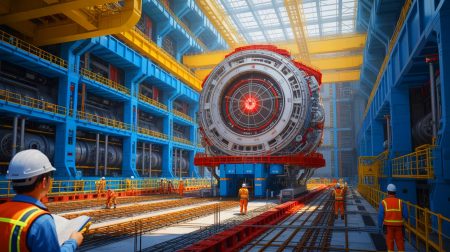| IN A NUTSHELL |
|
The collaboration between Kandi Technologies and CBAK Energy marks a significant development in the U.S. energy landscape. By establishing lithium battery production facilities on American soil, these Chinese firms are positioning themselves to meet the increasing demand for electric power in the off-road and recreational vehicle sectors. Amid rising geopolitical tensions, this move underscores a strategic focus on localizing production and fortifying supply chains. The partnership promises to deliver high-performance battery systems, aligning with U.S. clean energy goals and offering a resilient response to potential global supply disruptions.
Strategic Shift, Local Focus
The initiative by Kandi Technologies and CBAK Energy represents a calculated strategic shift aimed at strengthening local production capabilities. The first facility will focus on the assembly of battery packs, while the second will concentrate on manufacturing battery cells. Each facility will function as a joint venture, with separate ownership structures reflecting the specific objectives and scale of each project. Kandi will lead the battery pack assembly plant, holding a 90% stake, while CBAK will take charge of the battery cell manufacturing, also retaining a 90% share. This dual approach is designed to integrate the production process, from initial cell manufacturing to the assembly of complete systems, ensuring a streamlined operation.
By setting up these plants, the companies aim to build a robust domestic supply chain, thereby reducing reliance on international sources. This move is further supported by clean energy incentives from the U.S. Inflation Reduction Act, which encourages the localization of energy production. Such strategic positioning not only helps in mitigating the risks associated with global supply chain disruptions but also enables these companies to capitalize on the burgeoning U.S. market for clean energy solutions.
Incentives and Expansion
The decision to establish these facilities in the U.S. aligns with broader goals of expanding market presence and leveraging local incentives. According to Feng Chen, CEO of Kandi Technologies, localizing production enhances the agility of the supply chain and aligns with U.S. clean energy policy incentives. This strategic move positions the companies to meet the rapidly growing demand in the off-road and recreational vehicle category, potentially creating significant shareholder value.
While the specific locations for these facilities are still under consideration, CBAK Energy is also expanding its production capacity globally. The company plans to reach a production capacity of 7.6 gigawatt-hours by the end of 2025. Additionally, new production facilities are being established in Southeast Asia, operational by 2026, to mitigate geopolitical risks. The North American market for off-road vehicles, valued at $16.7 billion in 2024, is projected to grow to approximately $25.0 billion by 2030, providing a lucrative opportunity for this partnership to tap into the expanding battery demand.
Navigating Geopolitical Tensions
The collaboration between Kandi Technologies and CBAK Energy unfolds against a backdrop of escalating geopolitical tensions, particularly between the U.S. and China. Recent trade disputes, including China’s suspension of exports of critical minerals, highlight the vulnerability of global supply chains. This partnership is a strategic response aimed at minimizing these geopolitical risks by establishing a more resilient and localized supply infrastructure.
Zhiguang Hu, CEO of CBAK Energy, emphasizes that their expertise in cell design and production is pivotal for setting up a reliable local supply for emerging vehicle platforms. The collaboration not only reflects a shared vision to globalize advanced battery manufacturing but also adapts to the evolving demands of the U.S. market. By focusing on local production and supply, Kandi and CBAK are effectively insulating themselves from potential international trade disruptions, ensuring a steady supply of battery systems for the U.S. market.
The Future of Battery Production
As the demand for off-road and recreational vehicles continues to surge, the need for efficient and high-performance battery systems becomes increasingly critical. The partnership between Kandi Technologies and CBAK Energy is poised to deliver on this demand, offering advanced battery solutions tailored for specific applications. Their focus on integrating cell and pack production not only enhances efficiency but also promises to deliver cutting-edge technology to the market.
By investing in U.S.-based facilities, these companies are preparing to play a significant role in the future of battery production. This move also aligns with broader global trends towards sustainable energy solutions and the transition to electric vehicles. As they navigate complex geopolitical landscapes and leverage local incentives, Kandi and CBAK are setting a precedent for the future of energy production in the United States.
The strategic collaboration between Kandi Technologies and CBAK Energy marks a pivotal moment in the landscape of battery production, with far-reaching implications for the U.S. market. As they develop local facilities, they not only address immediate market demands but also contribute to shaping a sustainable energy future. How will this partnership influence the broader dynamics of international trade and energy production in the years to come?
Did you like it? 4.6/5 (20)









Wow, $100 billion revolution! Is this the end of U.S. energy dominance? 🤔
Propaganda
Nonsense
Thank you for shedding light on this topic! Always interesting to see global shifts in power.
Why is the U.S. letting Chinese companies set up such major facilities on their soil? 🤨
Thank You Trump – You are the Greatest President, in History. The mainstream, Fake News, Hates the USA, You Clearly Love the USA.
Isn’t this a bit of a slippery slope for the U.S. energy sector?
Finally! More competition in the battery market can only be a good thing. 🏆
What will the impact be on U.S. jobs? Are these companies hiring locally?
Do these moves mean cheaper battery prices for consumers in the future?
Can someone explain how this affects the average consumer? 🤷♀️
This seems like a strategic play by China. Should we be worried? 😬
I wonder how this will affect the current battery market in the U.S.
Great article! I’m excited to see where this goes in the next few years.
Are these new facilities environmentally friendly?
Looks like the U.S. needs to step up its game! 🇺🇸
What about the geopolitical risks mentioned? Are they really that severe?
Can’t wait to see how this unfolds. More power to green energy! 🌍
This is huge news. What about the competition from other countries?
Are there any potential downsides to this move?
How long before these facilities start production?
Do Kandi and CBAK have any experience in the U.S. market?
The future looks electric! 🔋
How will this affect the price of electric vehicles?
Is this a direct response to the Inflation Reduction Act?
Not sure how I feel about this. Shouldn’t we focus on local companies?
Are there similar projects happening in other countries?
How will this impact the environment in the U.S.?
Does this mean we’ll see more Chinese influence in the U.S. energy sector?
Hope this brings more innovation to the industry!
Are there any security concerns with these facilities? 🔍
Why choose the U.S. for these plants? Logistics or politics?
Isn’t it ironic that U.S. energy dominance is being challenged on its own soil?
Will this collaboration drive down battery costs worldwide?
What are the implications for global supply chains?
Is the U.S. government involved in any way?
Can we expect more partnerships like this in the future?
Is this a win for renewable energy advocates?
Excited to see more sustainable energy solutions being developed! 🌱
Fuck you and the ev bullshit hope all you stupid fuckers burn alive nobody gives a fuck about wasting time and materials none of this is news
Chinese propaganda. There is the initial adjustment but not as exaggerated like you government paid propagandist make it out to be
Oh. We will see about that. Makes sense after the Venezuelans terrorized colo springs outta the plant was “supposed” to be there.. it was a danish firm I believe. Fun fact: virtually everything in Venezuela is from China. The CCP has a lot of control there…Hmmm.
Let’s do what they do, once they get up and running, steal all of it for ourselves. Worked wonders for those rat bastards. Down with communism.
The headline is stupid and misleading
By forcing the Chinese to build their battery factory in the US, it means more US jobs and investment in the local economy. Victory to America and President Trump.
They will be forced to sell to local investors.
This article seems paid for by the Chinese Communist Party. There’s not an ounce of truth in it.
You do realize that the author of this article is propagandist and full of sh……it
😂
How ’bout no
In the Oboma era with a different congress, America tried to “seed” our own upstate battery industry but the opposition party (Republicans, FOX-ENTERTAINMENT-NEWS and Trump) did everything to deride the effort and kill it off. It was an early effort but America could be driving technology if not for the MAGA naysayers. So regressive!
China owns 90% would be interesting to see how much the taxpayers funded this venture in giving 90% away to China. I’m sure it’s hundred to billions of dollars knowing the stupid Demi Rats lack of business intelligence
Great China owns 90% let’s do a little investigation to see how much of the taxpayer dollars were used to give China 90% ownership in our own country. Sounds like a class Demi Rat pay for everything and get nothing in return